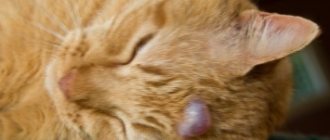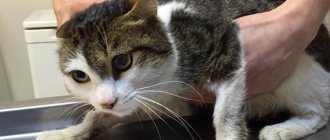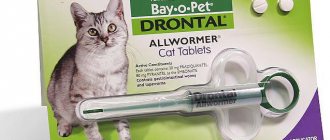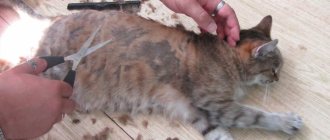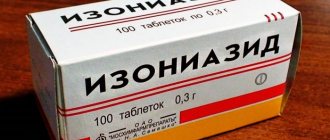Helminthiasis is a common disease that is often diagnosed in animals, including cats that are susceptible to infection with parasites. Contrary to the popular belief that helminthiasis occurs only in street cats or pets that often walk outside, the disease also occurs in pets that have never left the house. The larvae can enter the cat's body along with poor-quality food, as a result of insufficient heat treatment; they can be brought indoors along with dirt on shoes or hands. Despite the apparent non-seriousness of the disease, helminthiasis can cause serious damage to internal organs and even cause death. In order not to bring your animal to a critical condition, it is better to find out in advance what is best to give your cat for worms, whether there are tablets to prevent worms in cats, and how to recognize that your pet is sick.
Causes of helminthiasis infection
Among the reasons why you may need anthelmintic for cats are:
- the presence of parasites on the skin and fur (lice eaters, fleas and others);
- the animal eats food contaminated with helminths - a good anthelmintic for cats may be needed after stale meat, low-quality fish, etc.;
- Infection may be caused by dirty, stagnant water;
- the problem may appear after contact with sick animals that have not undergone treatment;
- kittens can become infected with helminths even before birth, in the womb of an infected mother.
The sooner the cause of infection is identified and eliminated, and antihelminthics for cats are prescribed, the faster the pet’s condition will improve.
Symptoms of the presence of worms
Any disease has stages of development. To prevent the disease from progressing, symptoms must be identified by observing and examining the cat. Here are several criteria that can confirm the presence of a parasitic disease:
- rare but severe cough;
- lack of appetite;
- causeless weight loss;
- bowel movement with bloody discharge;
- specimens of parasites in feces;
- bloating (inflammation in the small intestine);
- hard abdominal cavity;
- microflora disturbance;
- diarrhea (worms produce prostaglandin particles, which cause watery diarrhea).
In advanced cases, to the already mentioned symptoms, new ones are added, which have an even more significant effect on the overall health of the animal:
- insufficient bowel movements (parasites irritate the intestines and interfere with the absorption of fats and other substances, thereby forming a buildup in the colon and, as a result, constipation);
- high temperature (the body is trying to kill parasites);
- allergies (helminths can locally destroy the intestines, as a result of which food particles enter the blood and cause inflammation);
- a significant decrease in activity (due to a deficiency of nutrients in the body, which cease to be absorbed with the appearance of parasites);
- violation of the skin (a large number of worms in the body provokes the appearance of rashes, boils, ulcers, etc.);
- pale eyes;
- brightening of the oral cavity;
- muscle and joint pain (worms can migrate, in this regard, muscle tissue is injured and the immune system begins a fight, which results in inflamed muscles);
- pain in the liver (happens when helminths form a plug in the bile duct).
IMPORTANT! Worms greatly weaken cats and if left untreated, the animal can die. Death occurs due to intestinal rupture. And the rupture occurs due to blockage.
Signs of helminthiasis
In the initial stage, helminth infection may be asymptomatic. Symptoms increase as the number of parasites increases; clinical manifestations depend on the type of worm, and the speed of their development depends on the age and weight of the animal.
Main symptoms:
- diarrhea or difficulty defecating;
- vomiting and other gastrointestinal disorders;
- blood and mucus may be present in the stool;
- the animal experiences itching in the anal area, which is quickly eliminated with deworming medications for cats;
- upon closer examination, worms or white larvae can be seen on the mucous membrane under the tail;
- if a remedy for worms for a cat is not prescribed in the near future, the pet’s belly swells and takes on a rounded shape;
- body weight is rapidly decreasing;
- loss of appetite;
- the animal sheds profusely, the quality of the coat deteriorates;
- there are breathing problems, a cough may be present;
- the pet gets tired quickly and prefers not to get up again;
- the mucous membrane becomes pale.
If a pregnant cat is infected with helminths, the risk of premature delivery increases. In addition, after giving birth, you will need a dewormer for kittens to prevent the condition of the newly born babies from worsening.
Classification of helminths
Roundworms are quite common
Types of worms in humans:
- Flatworms
- Roundworms
Flatworms include:
- Trematodes (opisthorchiasis, schistosomes, paragonimus)
- Cestodes (wide tapeworm, pork tapeworm, echinococcus, alveococcus)
- Roundworms or nematodes:
- Pinworm
- Ascaris
- Hookworm
- Trichinella
This classification of helminths is presented in the medical literature. To successfully solve a problem such as helminthiasis, it is necessary to find out in-depth characteristics of the structure and life cycle of parasites.
Trematodes
Another name for trematodes is flukes. These parasites are flat leaf-shaped or lanceolate with two suckers. One sucker is located in the mouth, and the second, which serves for attachment, is in the peritoneum. All representatives of flukes enter the body through an intermediate host. Most of these parasites are hermaphrodites.
Opisthorchiasis
This is a fluke - a worm up to 1.3 cm long with two suckers. Opisthorchiasis is a hermaphrodite that parasitizes the liver, gall bladder, and pancreas in humans and some carnivorous animals (foxes, dogs, cats). Opisthorchiasis eggs come out of the human or animal body in feces. When these eggs enter a body of water, they are swallowed by freshwater mollusks, within which the larvae hatch and develop. The process of development and maturation of larvae lasts two months. Then the larvae crawl out of the mollusk and penetrate the skin of carp fish. After six weeks, the larvae become full-fledged mature parasites. Opisthorchiasis enters the animal or human body after eating contaminated fish. This worm can live in a living organism for up to 20 years. Symptoms of opisthorchiasis:
- Allergy
- Weakness
- Headache
- Dizziness
- Depression
- Loss of consciousness
Harm caused to the body by opisthorchiasis:
- Poisoning by parasite waste products
- Damage to liver tissue
- Gallbladder damage
- Impaired outflow of bile
- Inflammation of the pancreas
- Secretory dysfunction
- Decreased gastric motility
- Thickening of the walls of some organs, the occurrence of tumors as a result.
The chronic course of the disease is characterized by:
Prevention
As with other diseases, doctors recommend paying due attention to prevention. To prevent an animal from becoming infected with helminthiasis, it is necessary to give anthelmintics to cats for prophylactic purposes:
- Animals walking outside should be given cat deworming tablets once a month;
- For cats who eat natural food, it is recommended to take deworming drops for cats once every 30 days;
- pets without free access to the street must be treated at least once a month;
- Anti-worm medications for kittens can be given from 3 weeks of age.
If you are planning to breed an animal, it is recommended to carry out treatment to prevent infection of the pregnant cat and the birth of infected offspring. Elderly cats should be treated with special care; a wide range of anti-worm medications for cats are given under the supervision of a doctor, after studying blood and urine tests. As for vaccinations, medications for deworming in cats should be prescribed 10 days before the scheduled date of the veterinarian visit.
Cat deworming plan
Before routine deworming of your cat, you need to make sure that the animal is healthy. To do this, it is recommended to visit a veterinarian who will select medications and a suitable treatment regimen. As a rule, prevention of helminthic infestations is carried out every three months. So, one year you can give an animal the Febtal-combo suspension, and the next year you can opt for the Dironet product. Particular attention is paid to those pets who often visit the street. Deworming is also carried out 14-27 days before mating, 3 weeks before birth, and for suckling kittens - 3 weeks after. Anthelmintic medications are best given in the morning on an empty stomach, which ensures the greatest effectiveness of treatment.
Anthelmintics for cats - which ones are better?
To get a competent answer to the question of what tablets to give your cat against worms, you need to seek help from a veterinarian. To select a drug and calculate the dose, you need to take into account the pet’s age, weight and health condition. Doctors recommend purchasing a wide range of anthelmintic drugs for cats and simultaneously treating them against external ectoparasites. It is strictly forbidden to give an animal several medications at once, this can lead to an overdose. Anthelmintic for cats is available in different forms, these can be tablets, syrups, suspensions or drops.
Why worm a cat before vaccination?
Vaccines contain weakened pathogens that are destroyed by the animal's immune system after vaccination. Parasites weaken the body, as a result of which the viruses that enter the body grow stronger and develop.
Vaccination in this case leads to the exact opposite effect - infection of cats. This is why worms must be destroyed before vaccination.
Tablets for cats from worms
The tablet form is convenient for storage and transportation, but not all animals are happy to take the entire medicine. To simplify the process, you can use an introducer, mix the tablet with food, or grind the drug into powder.
Effective tablets for cats against worms:
- Drontal;
- Cestal Cat;
- Milbemax;
- Azinox;
- Gelmimax-4;
- Milprazone;
- Dirofen;
- Dironet;
- Febtal;
- Celandine Antihelmintic;
- Dehinel;
- Alben S;
- Helmintal T;
- Milbemax..
Features of the drugs
Medicines are classified according to a number of criteria:
- destroying several varieties of parasites;
- aimed at getting rid of certain types of worms.
Also, anthelmintics differ in their mechanisms of action:
- affecting the nerve cell system of worms;
- destroying the shell of parasites (a kind of burning of body cells occurs);
- paralyzing the muscle fibers of the worm (the parasite is completely immobilized).
To increase the effectiveness of the drug, you need to familiarize yourself with the basic rules of treatment. The first step is to undergo a mandatory procedure for examining your pet's stool . This will allow you to quickly determine the type of parasite. Only then can the veterinarian prescribe the appropriate treatment.
In cases where it is not possible to show the purr to a specialist, it is recommended to purchase a drug that has a wide spectrum of action. For preventive purposes, deworming should be carried out every 3 months. It is necessary to drive away worms before mating and on the eve of vaccination.
Under no circumstances should kittens under 21 days of age be wormed. Also, you should not give an anthelmintic drug in the first weeks of pregnancy. It is forbidden to drive worms in case of any suspicion of kidney or liver disease and in exhausted pets.
Administration of liquid medication is usually done through the use of a measuring syringe. This procedure is quite simple and does not require special knowledge.
However, when taking pills, not every purr will happily drink the offered drug and lie quietly during the procedure. How to give medicine in this case? In order to be sure to feed the required portion of the tablet drug, you can use two common methods:
- We wrap the animal in a towel. It is very important to fix the fabric well. With one hand we press on the corners of the mouth and wait for the cat to open its jaws. Using your other hand, place the tablet at the base of the tongue and tightly close your pet’s mouth. Raise the cat's head and stroke its throat a little. In this way, swallowing movements are induced, and the animal is sure to swallow the medicine.
- Delicious way. The tablet is ground into powder and mixed in sour milk or minced meat.
The drug should be taken in the morning 60 minutes before meals. When treating a cat, it is necessary to re-give the medicine after the first dose in 14-15 days. For preventive purposes, it will be enough to organize a one-time appointment.
Indications for use
Anthelmintic drugs can be prescribed to a cat, both for treatment and for preventive purposes to get rid of helminthic infestation.
Indications for the use of tablets may include sudden onset symptoms, which include:
- Decreased appetite – the pet eats less than usual or refuses food altogether. Occasionally, a furry pet may begin to destroy interior items.
- External signs are rapid loss of body weight, constant fatigue, the desire to find a secluded place, and an enlarged abdomen.
- The condition of the coat is the appearance of dishevelment, hair falling out in clumps or excessive oiliness of the hairs.
- Teariness of the eyes, yellowing of the sclera.
- Attacks of vomiting after eating.
- Diarrhea.
- The appearance of coughing and sneezing.
- Itching after going to the toilet.
- The appearance of blood in the stool.
Broad-spectrum anthelmintic drugs for cats in the form of a paste
The paste has an ointment-like shape and a pleasant aroma; it is convenient to give it to animals, observing the correct dosage. You can give your cat DIROFEN paste from APICENNA for worms.
You can purchase anthelmintic drugs for cats from us. Look at the product descriptions, indications, contraindications and choose the one that suits your pet:
note
Quick view
PRAZITEL SPECIAL SUSPENSION anthelmintic for cats and kittens (10 ml)
10 ml
256 ₽
Show all offers
Quick view
HELMINTAL T anthelmintic for kittens and adult cats weighing up to 4 kg pack. 2 tablets (1 pack)
1 pack
279 ₽
Show all offers
Quick view
MILBEMAX – anthelmintic for kittens and small breed cats. 2 Elanko tablets (1 piece)
1 PC
374 ₽
Show all offers
Quick view
DEKHINEL anthelmintic for adult cats pack. 2 tablets KRKA (1 pack)
1 pack
302 ₽
Show all offers
Quick view
GELMIMAX-4 anthelmintic for kittens and adult cats pack. 2 APICENNA tablets (1 piece)
1 PC
to order
Show all offers
Anthelmintic drops for cats
Preparations in the form of drops are used for external treatment of the animal and are used to combat external and internal parasites. Among other advantages, it should be noted that you do not have to forcibly restrain the animal to apply the drug. Effective drops for cats against worms and parasites:
- Helmintal K Spot-On;
- Profender.
Determine which deworming medicine for cats is suitable for your animal and will be convenient for use.
Cat fleas
Most often, cat owners have to look for ways to control fleas. These insects feed on blood and can bite a dog or a person, but they prefer to breed on representatives of the cat family. The most attractive areas for them are the chest and back. If there are too many fleas, eczema, anemia, and other diseases can begin. The main symptoms are:
- restless behavior;
- the appearance of graininess on the skin;
- continuous carding.
The modern assortment includes many insecticides that provide effective control of insects. The products are available in the form of liquids, powders, and sprays. Collars with anti-flea impregnation are available for sale. The convenience of such an accessory is undeniable. But some products have an odor that is too intense for the animal to tolerate. In addition, cats often take off their collar. It is better to use such accessories as a preventive measure if the cat tolerates it calmly.
Aerosols, drops, and special powder can be used to kill fleas. It is important to strictly follow the instructions for use. If the infection is severe, it is necessary to use a bathing procedure with a special shampoo. After washing, the wool must be rinsed thoroughly. If insecticide enters the body, it can lead to severe poisoning.
It should be noted that fleas can reproduce not only on the cat’s body. You need to treat upholstered furniture that your pet often sits on and its bedding. For this procedure, you can use ordinary household chemicals with insecticides. But before treatment, the animal must be removed from the premises. You can get rid of fleas in the house with the aromas of coniferous trees and wormwood.
In addition to fleas, cats can also get lice. They are distinguished by a light gray color and are also blood-sucking. Treatment methods for lice and fleas are similar. But you will have to repeat the processing several times. The coat must be combed thoroughly to remove nits.
Is it possible to prevent helminthiasis infection?
To minimize the risk of infection for your pet, you should adhere to the following rules:
- avoid contact with infected animals;
- carry out preventive treatment against ticks and fleas in a timely manner;
- do not feed raw fish and meat, give preference to balanced ready-made food;
- Give deworming medication to cats regularly as a preventive measure.
Veterinarians strongly do not recommend giving animals untested drugs or using folk remedies with unproven effectiveness.
